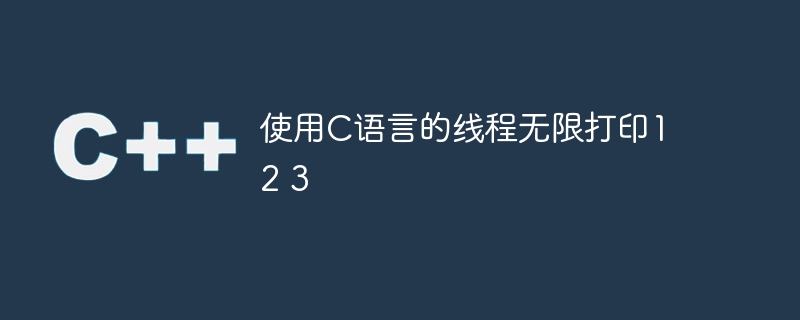

Here we need to repeatedly print the 1 2 3 sequence infinite times using threads in C programming language.
Let’s take a look at the sample output of our code:
1 2 3 1 2 3 1 2 3 1 2 3
For this we will need to use three Threads running in parallel in C programming language. You also need a variable that is initialized to 1 in the first thread and has its value updated based on its previous value. Then run an infinite loop inside the function.
Let's look at the program that implements our solution:
#include <stdio.h>
#include <pthread.h>
pthread_cond_t cond1 = PTHREAD_COND_INITIALIZER;
pthread_cond_t cond2 = PTHREAD_COND_INITIALIZER;
pthread_cond_t cond3 = PTHREAD_COND_INITIALIZER;
pthread_mutex_t lock = PTHREAD_MUTEX_INITIALIZER;
int value = 1;
void *foo(void *n){
while(1) {
pthread_mutex_lock(&lock);
if (value != (int)*(int*)n) {
if ((int)*(int*)n == 1) {
pthread_cond_wait(&cond1, &lock);
} else if ((int)*(int*)n == 2) {
pthread_cond_wait(&cond2, &lock);
} else {
pthread_cond_wait(&cond3, &lock);
}
}
printf("%d ", *(int*)n);
if (value == 3) {
value = 1;
pthread_cond_signal(&cond1);
}
else if(value == 1) {
value = 2;
pthread_cond_signal(&cond2);
} else if (value == 2) {
value = 3;
pthread_cond_signal(&cond3);
}
pthread_mutex_unlock(&lock);
}
return NULL;
}
int main(){
pthread_t tid1, tid2, tid3;
int n1 = 1, n2 = 2, n3 = 3;
pthread_create(&tid1, NULL, foo, (void *)&n1);
pthread_create(&tid2, NULL, foo, (void *)&n2);
pthread_create(&tid3, NULL, foo, (void *)&n3);
while(1);
return 0;
}1 2 3 1 2 3 1 2 3 1 2 3 1 2 3….
The above is the detailed content of Infinite printing 1 2 3 using threads in C language. For more information, please follow other related articles on the PHP Chinese website!




